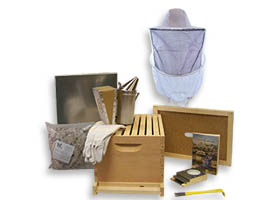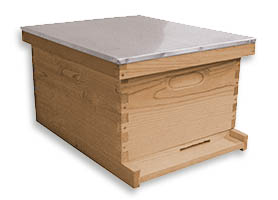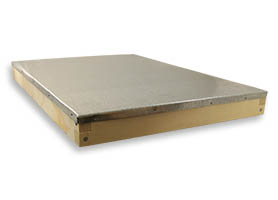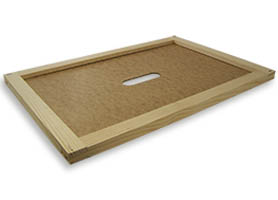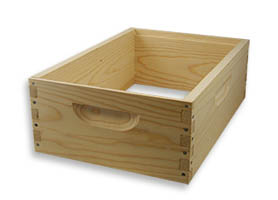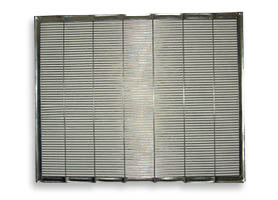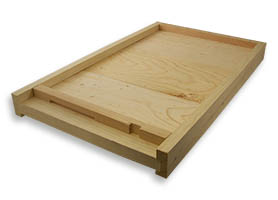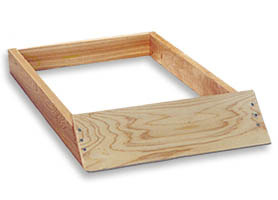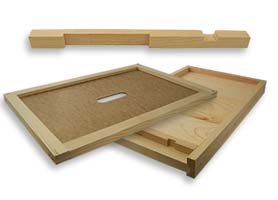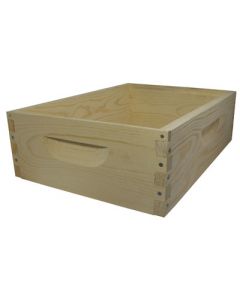8-Frame
8-Frame Bee Hives
Why Some Beekeepers Choose 8-Frame Hives
Beekeepers who prefer the classic Langstroth hives can choose between 10-frame or 8-frame hives. 10-frame hives have been the standard since the beginning of beekeeping, but 8-frame bee hives have increased in popularity over the past decade. These frames are ideal for smaller areas, making it the perfect option if you have limited space available for your bee yard.
The basic configuration of a Langstroth hive is composed of seven parts: the hive stand, bottom board, entrance reducer, brood box, super, inner cover, and telescoping outer cover.
Talking to your local beekeeping groups and finding a mentor is a great way to find good advice. Although beekeepers have similar systems implemented to keep colonies thriving, individuals may have their own little preferences and quirks when it comes to raising bees.
Unique Factors of 8-Frame Hives
Here are a few reasons why beekeepers will choose an 8-frame bee hive over a 10-frame hive.
Bee Movement
Consider bees' preferred bee hive, a hollow tree. This shape encourages bees to move up when they fill up space with honeycomb.
In 10-frame hives, bees may follow their instincts and move up to the next box before using all 10 frames, unless honey production is heavy. Because 8-frame hives are narrow and use less frames, bees will fill up all frames before moving up.
Winter
In winter, bees cluster for warmth and move together to reach food storage. Compared to 10-frame hives, 8-frame hives’ narrower shape works better for winter clustering and promotes warmer temperatures.
Bees will not have to break their winter cluster to reach the 1st and 10th frame.
To better promote warmth in the winter, try this Easy On Hive Cover for 8-frame bee hives. Caring for your hive in winter and ensuring the bees keep warm increases their chance of survival so they can resume making honey in spring.
Smaller, Lighter Hives
8-frame hives are not only lighter, but also the center of gravity is closer to your own. This makes them easier to move, even when full.
You can also raise more colonies. 8-frame hives take up much less space than 10-frame hives, which means that you can have more 8-frame hives in your bee yard. If you have a small backyard, an 8-frame hive is perfect for your bees.
8-frame hives have two less frames to inspect per box. However, you may have more honey supers to inspect depending on the colony’s level honey flow and brood production. If your colonies tend to have heavy honey and brood production, 10-frame hives may be more useful to you.
Disadvantages of 8-Frame Hives
Although there are numerous advantages to owning small bee hives, there are also a few matters that are worth noting.
One major factor about 8-frame hives is that there is no difference between 10-frame and 8-frame hives when it comes to swarming.
Swarming occurs when the queen believes that they need more space for brood production. A queen excluder may help, but she may still feel limited in space.
You may have to purchase more deep boxes as well. As a result, the hive stack can be too high and tip over, especially on windy days or in windy climates. Although there are less frames per box, you may have to inspect more frames during hive inspections.
It may be more difficult for you to find tools and accessories compatible with small bee hives. Because 8-frame equipment is still in development, you may have to get creative or take more time to search for them.
Essentially, 8-frame hives are smaller than 10-frame hives and hold two less frames, which makes them lighter and easier to move from one location to another. These hives also fit in a smaller area, which makes them better for smaller bee yards and backyard beekeeping.
New to beekeeping? Consider taking a look at our hive kits, available for both 10-frame hive kit and 8-frame hive kit, or our fully assembled 10-frame complete hives and 8-frame complete hives.
Please contact Dadant & Sons by calling (217) 847-3324 or emailing dadant@dadant.com if you have questions about our 8-frame bee hives.

